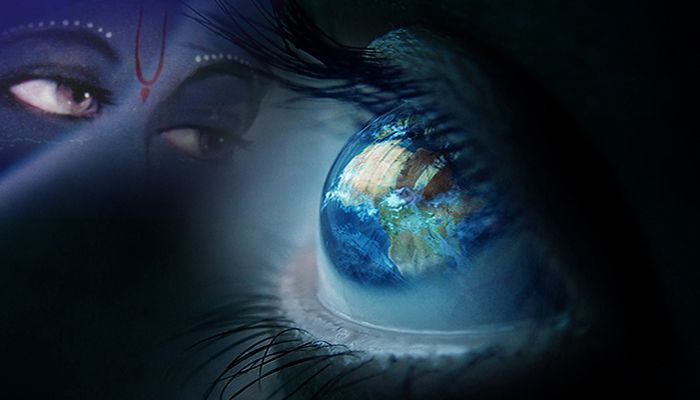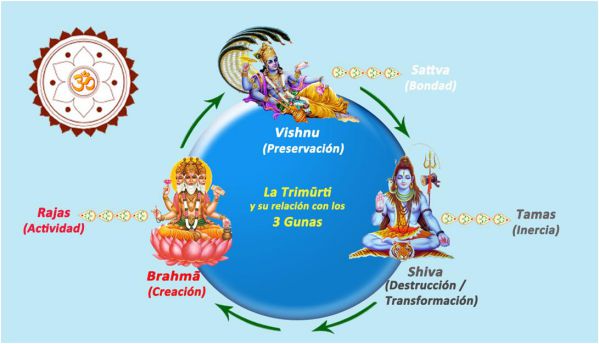No products in the cart.
In the great epic Mahabharata, when Duryodhana enters the hall of illusion (maya sabha), he loses his way, becomes confused and envious. Seeing his predicament when Draupadi, laughs at him, he becomes uncontrollably angry, feeling insulted, and vows to take revenge against the Pandava clan for their audacity to display their power and wealth to belittle him in the presence of women. It is in the hall of illusions that the seeds of the great Mahabharata war were actually sown which germinated and ultimately consumed the whole Kuru family bringing them untold misery and great destruction. The epic Mahabharata shows in many ways how human beings can bring misery and destruction to themselves and others through their weaknesses, egoism and selfishness, unmindful of the consequences of their thoughts, desires and actions and where they may lead them eventually.
The world in which we live is also not very different from the hall of illusions we read about in the Mahabharata. We also live here enveloped by illusion ( maya ), in a state of ignorance about ourselves, whereby we fail to discriminate between truth and false hood, become confused, engaging ourselves in egoistic struggles and binding actions, and lose our connection with God and our own divinity.
One of the unique concepts of Hinduism is maya, which is actually used to describe our current state of existence, how much alienated we are from our true nature and how deeply entangled we become with the objects of our desires, weaving in the process a web of deceptions around ourselves that keep us conveniently concealed from the truth of who we are or what we should have been. It is a state in which each individual soul considers itself to be someone else, separate and distinct from the rest of creation and God Himself.
Our scriptures make it clear that our world is a trap and maya is the trapping mechanism. It is the idea of butter or the temptation of curiosity or some wicked desire that brings us here in the first place and puts us in contact with the objects of our world. Once we taste it, we enter into a make believe world and stop thinking about going back. We become involved with the process of becoming and being, as embodied souls, imprisoned in our own thoughts and desire bodies, undergoing births and deaths, binding ourselves to the consequences of our own actions and delaying our own liberation. And who unleashes this potent force? God is described in the Hindu scriptures as Mayavi, the grand master of illusion. He casts his net of illusion to catch the individual souls that are swimming in the waters of life as free souls, enjoying the highest bliss. He then drops them in the lap of His dynamic energy or Shakti to take care of the rest of the process. Maya or illusion thus becomes a very potent instrument in the hands of the Divine Prakrti, the Primal Nature. Through the force of illusion, she holds the beings under its sway.
This objective is accomplished through the interplay of the triple gunas, the sattva, rajas and the tamas and the grand play of desires by the formation of the ego and loss of buddhi or the power of discrimination. Under their influence, the indwelling Purusha becomes attached to the outside world and thereby suffers from delusion of the mind and lack of discrimination and true knowledge. God is also described as the concealer. He hides Himself from Himself in our minds and bodies and there by perpetuates the belief that He is not what He is or that He is different from what He is. Maya therefore is not only a binding mechanism but also a concealing mechanism. The Gita teaches us how to deliver ourselves from this delusion of mind and thereby from our bondage to the cycle of births and deaths and the pairs of opposites such as pain and pleasure or happiness and sorrow. The true meaning of the word “moksha” is not salvation but destruction of moha or delusion that precedes salvation.
- The Senses: The sense which are ten in number (five external and five internal) are the main instruments of Maya through which it deludes the beings by developing in them the desire for sense objects. According to the Bhagavad-Gita, out of desire comes attachment and out of attachment a man becomes deluded.
- Loss of buddhi (discrimination): Senses are imperfect instrument of truth. They cannot go beyond the sense objects. Therefore they actually breed ignorance. Beings who depend upon the senses cannot go beyond the visible and perceptible world. This results in ignorance and the loss of wisdom to know the reality from unreality, to discern correctly truth from untruth, good from bad, divine from demonic, right action from wrong action and so on. Out of the ignorance thus born, the individual soul indulges in wrong actions, beliefs, thoughts, false knowledge, ignorant
- Desires and attachment: The person under the influence of Maya is always attached to the world outside him. Not only to the world, but very much to his own egoistic identity of himself, his possessions and his relations. Memories pursue him, time haunts him and thoughts possess him. By becoming attached to the world, conditioned by memory and accumulated knowledge, he develops envy and selfishness and also many such negative qualities as pride, fear, greed, anger, malice, caprice, cruelty, callousness, lust and intense desire for success and personal advancement. Life becomes a battle field in which he alone has to win. There is no place for failure and weakness. Attracted to pleasures, averse to pain, fearful of loss and hopeful of gain, unable to go beyond the lures and temptations of the world, though aware that all is vain in the end, he plods on, striving and struggling, as if death would never touch him
- Sense of duality and multiplicity: The man of delusion cannot see the One hidden in all. He sees only the diversity and the multiplicity of the life and the world around him. Feeling lonely and isolated, unable to trust others and the world he lives in, as if the world is an enemy determined to subdue him and destroy him, he suffers from intense anxiety about himself and his future. Because of the sense of duality he loses his unified vision and sees the world in terms of pairs, divisions, groups, categories, numbers and opposites, and in short, in terms of relative and subjective reality.
- Ego and False identification: under the influence of illusion, the jivas or individual souls develop ego sense, the sense of separateness and pride in their individual merit, personal possessions and achievements. The ego is responsible for the sense of ownership and doer ship, identification of the individual with his body and mind, and failure to know his true nature. It makes the individual souls think and act selfishly and egoistically as if they are different from the others and engages them in acts of self-preservation characterized by competition and conflict and cooperation and friendship. Thus the ego ultimately lands all the beings into suffering, delusion and bondage to the earthly life.
- Incorrect Relationship with God: the beings under illusion cannot see the Invisible God and so they cannot correctly comprehend Him. They cannot see Him in all and all in Him. They cannot go beyond the senses and the gunas and experience the soul consciousness. Even if they do, they cannot contain that experience in their limited consciousness. Because of egoism they would not acknowledge God and would not surrender themselves to Him. Due to their inherent imperfections and negative qualities, they fail to show true devotion to God and realize Him in themselves.
- Mortality and the Cycle of birth and death: Under the influence of illusion, when a jiva or being indulges in egoistic actions, accepting the sense of doer ship, with a desire to enjoy the fruit of actions, it becomes subject to the laws of karma and dharma and returns again and again to the world of mortality. Depending upon its previous actions, it takes birth in different wombs, circumstances and families and pays the price in the form of suffering from the consequences of its previous actions. This process goes on repeatedly till it realizes its folly and engages in right actions with the right attitude, which is prescribed in the Bhagavad-Gita and lays a foundation for its progression towards its freedom and self-realization.
- What is the Truth? We all suffer from the grand illusion that what we know and experience through our senses is the truth and that we are capable of knowing the facts of our existence with the help of our minds and senses, whereas the truth is we cannot discern reality with our limited consciousness. We cannot answer the question about truth truthfully, because we do not know the answer. We may give an answer, some answer, but that answer would not be correct. It may satisfy our mental curiosity but not our soul’s deepest yearning to be itself. The predicament we face is how can we define something that we have not been able to experience consciously? How can we bring that into our field of experience when it does not exist here? We may explain the transcendental truths of our existence and describe it in roundabout ways, but we cannot translate it perfectly into words unless we can contain and maintain the absolute truth in an absolute way.







